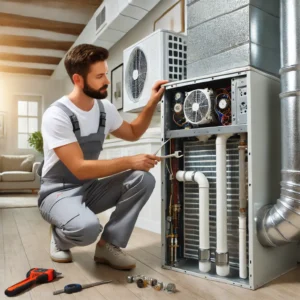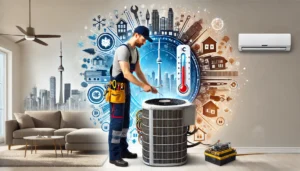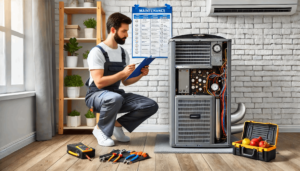Introduction
Maintaining your heating and air conditioning systems is essential for ensuring comfort, energy efficiency, and long-term performance, especially in Ontario, where the climate swings between frigid winters and humid summers. Regular HVAC maintenance helps your system cope with these extremes, reducing the risk of breakdowns and keeping your home comfortable year-round. Beyond just improving efficiency, routine checks can also extend the life of your equipment and prevent costly repairs, saving you money in the long run.
For Ontario residents, where weather can be unpredictable, scheduling regular HVAC maintenance ensures your system is always prepared to handle the demands of the season. This blog will explore why regular heating and air conditioning maintenance is crucial and how it can benefit you both financially and in terms of comfort.
Understanding the Importance of HVAC Maintenance in Ontario
Regular maintenance of heating and air conditioning systems is crucial for maintaining comfort, especially in a region like Ontario, where extreme weather fluctuations are the norm. From harsh winters to hot, humid summers, Ontario’s climate puts a lot of pressure on HVAC systems. This makes routine maintenance essential for ensuring that these systems perform efficiently year-round. Below, we’ll explore how Ontario’s unique climate impacts HVAC systems, the effects of seasonal changes, and the common issues homeowners face without proper upkeep.
Impact of Ontario’s Climate on HVAC Systems
Ontario’s diverse climate, which includes freezing winters and warm, humid summers, can take a toll on heating and air conditioning systems. During the winter months, HVAC systems are heavily relied upon for heating, often running continuously to maintain a comfortable indoor temperature. The same systems are switched to cooling during the hot summer months, further increasing wear and tear.
The biggest challenges that Ontario’s climate poses to HVAC systems include:
- Cold weather strain: During harsh winters, furnaces and heat pumps work overtime, especially in older homes that may not be well-insulated. This can lead to issues such as worn-out motors, reduced efficiency, and breakdowns. If the system isn’t well-maintained, it could fail at a critical time, such as during a deep freeze, leading to emergency repairs.
- Heat and humidity stress: Ontario summers bring high humidity, which makes air conditioning systems work harder to both cool the air and remove moisture. This extra workload can strain the system, leading to overheating, refrigerant leaks, or decreased performance if not properly maintained.
Routine HVAC maintenance, especially before the start of winter and summer, helps prepare the system for the intense demands placed on it during Ontario’s coldest and hottest months.
How Seasonal Changes Affect Heating and Air Conditioning
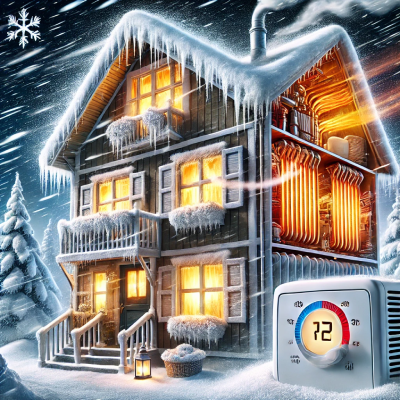
The drastic seasonal changes in Ontario mean that HVAC systems must transition from heating to cooling modes, often within the same month. This constant switching can increase wear and tear on components like compressors, fans, and thermostats. Without regular maintenance, these transitions can lead to sudden system failures or inefficient operation.
Seasonal maintenance ensures that:
- Filters are replaced: Filters can become clogged with dust and debris, reducing airflow and causing the system to work harder. Replacing filters regularly during the season change is a simple way to improve efficiency and prevent unnecessary strain on the system.
- Thermostats are properly calibrated: Seasonal changes can cause your thermostat to work inefficiently if not regularly inspected. If a thermostat is not reading the temperature accurately, it may cause the system to overwork, leading to higher energy bills and inconsistent indoor temperatures.
- Refrigerant levels are checked: When transitioning from winter to summer, it’s important to ensure that refrigerant levels in the air conditioner are at the proper levels. Low refrigerant can significantly impact the system’s ability to cool the air, especially during Ontario’s hot, humid summer days.
By scheduling seasonal tune-ups, Ontario homeowners can avoid breakdowns, lower energy bills, and ensure consistent comfort throughout the year.
Common HVAC Issues Faced by Ontario Homeowners
Given Ontario’s demanding climate, homeowners commonly face a range of HVAC issues. Many of these problems are directly linked to a lack of regular heating and air conditioning maintenance, resulting in both minor annoyances and major system failures. Below are some of the most frequent HVAC issues encountered by homeowners in Ontario:
- Frozen pipes and coils: During winter, furnace systems and heat pumps are prone to freezing, especially when temperatures drop dramatically. If not addressed, frozen coils can stop the system from producing heat, and frozen pipes can lead to costly water damage.
- Clogged filters and ducts: Ontario’s seasonal pollen, dust, and airborne pollutants can cause filters and ducts to clog, reducing airflow and diminishing system efficiency. If not cleaned regularly, this can cause the system to overwork, leading to higher energy bills and a shortened system lifespan.
- Thermostat malfunctions: Inaccurate thermostat readings or malfunctioning thermostats are common in older homes. This can lead to rooms being too hot or too cold, further stressing the system as it struggles to maintain a comfortable temperature.
- Refrigerant leaks: Air conditioning systems often suffer from refrigerant leaks during the summer months. A leak can severely affect the system’s ability to cool, and if not repaired promptly, it can lead to major system damage or the need for a costly replacement.
By understanding the climate-related challenges and common issues that arise in Ontario, homeowners can take proactive steps through regular HVAC maintenance to avoid these problems and ensure their systems continue to run smoothly.
Key Benefits of Regular Heating and Air Conditioning Maintenance
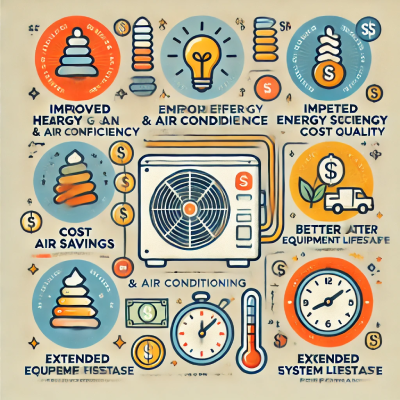
Regular heating and air conditioning maintenance provides a range of benefits that not only improve system performance but also help homeowners save money and increase comfort. Whether it’s boosting energy efficiency, extending the lifespan of the HVAC system, or preventing costly repairs, routine care of your HVAC system is crucial, especially in regions like Ontario, where climate extremes are common. Below, we’ll explore three key benefits of regular heating and air conditioning maintenance.
Improved Energy Efficiency
One of the most significant advantages of regular HVAC maintenance is the improvement in energy efficiency. When a heating and cooling system is not properly maintained, it has to work harder to regulate the indoor temperature, which in turn uses more energy. This can lead to higher energy bills, especially during Ontario’s cold winters and hot, humid summers when HVAC systems are running almost continuously.
Here’s how maintenance boosts efficiency:
- Clean filters and ducts: When air filters and ducts are clean, the system can operate more efficiently because air flows through without obstruction. A clogged or dirty filter makes the system work harder to push air through, leading to increased energy consumption. Replacing air filters regularly during maintenance ensures that the system isn’t overworking.
- Optimized performance: Technicians check components such as coils, fans, and motors during routine maintenance. Cleaning these parts and ensuring they are in good working condition helps the system run smoothly, reducing the amount of energy required to heat or cool your home.
- Proper refrigerant levels: For cooling systems, having the right refrigerant levels is crucial. Low refrigerant can cause the system to struggle in cooling the air, leading to more energy usage as the system runs longer. Regular maintenance ensures refrigerant levels are topped up and leaks are repaired promptly.
By ensuring your HVAC system is running efficiently, you can reduce your energy bills and your home’s carbon footprint.
Extended System Lifespan
Another major benefit of regular heating and air conditioning maintenance is the extended lifespan of your system. HVAC systems are significant investments for homeowners, so prolonging their life as much as possible is essential to get the most value out of them.
Routine maintenance addresses minor issues before they become major problems, reducing wear and tear on critical system components. Here’s how maintenance extends the life of your HVAC system:
- Reduced wear on parts: When HVAC systems are maintained properly, components like the motor, fan, and compressor are less likely to experience excessive strain. Small parts, such as belts and bearings, can be replaced or adjusted before they cause larger, more expensive components to fail.
- Prevention of rust and corrosion: In heating systems, moisture can build up and cause rust or corrosion if not cleaned or drained regularly. Similarly, cooling systems can suffer from clogged condensate drains that may lead to water damage. Regular maintenance prevents these issues from damaging your system’s most important components.
- Balanced operation: A properly maintained system operates more smoothly, which ensures that parts wear evenly over time. This balance reduces the risk of major failures and extends the overall lifespan of the unit.
By investing in regular HVAC maintenance, you can avoid the need for early system replacement, saving you thousands of dollars in the long run.
Prevention of Costly Repairs
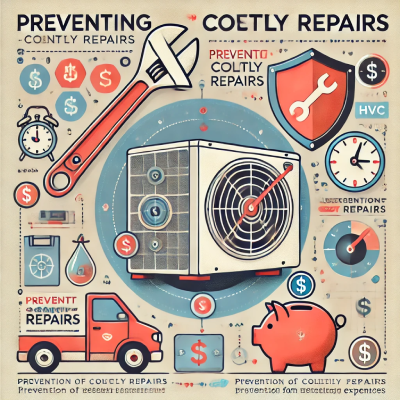
Perhaps one of the most compelling reasons to schedule regular heating and air conditioning maintenance is the prevention of costly repairs. Without routine maintenance, small issues can go unnoticed and escalate into major problems that require expensive repairs or even system replacement.
Here are the ways maintenance helps you avoid unnecessary repair costs:
- Early detection of issues: Regular inspections allow technicians to identify problems such as worn-out parts, loose electrical connections, or refrigerant leaks early on. By addressing these issues promptly, you avoid the risk of catastrophic system failure, which often results in high repair costs.
- Reduced risk of emergency breakdowns: HVAC systems tend to break down at the most inconvenient times, such as during a heatwave or a cold snap. Emergency repairs, especially during off-hours, are usually more expensive than regular maintenance. Scheduling regular checkups prevents these unexpected breakdowns.
- Maintenance under warranty: Many HVAC manufacturers require proof of regular maintenance to honor their warranties. If your system breaks down due to a lack of maintenance, you may end up paying for costly repairs out-of-pocket, as the warranty could be voided. Regular maintenance ensures that your system remains covered by the manufacturer’s warranty, protecting you from hefty repair costs.
By staying proactive with routine HVAC maintenance, you can avoid expensive repairs, extend the life of your system, and ensure that it operates efficiently year-round.
What’s Involved in Routine HVAC Maintenance?
Routine maintenance of heating and air conditioning systems is essential to ensure they run efficiently, reduce the risk of breakdowns, and extend their lifespan. A well-maintained HVAC system helps you save on energy bills, improves indoor air quality, and prevents costly repairs. In this section, we’ll explore three important tasks involved in routine HVAC maintenance: regular filter replacement, inspection of ductwork and vents, and checking thermostat calibration. These tasks are simple but crucial for the longevity and performance of your heating and cooling system.
Regular Filter Replacement
One of the easiest yet most essential parts of HVAC maintenance is replacing the air filters regularly. Filters trap dust, pollen, and other airborne particles, preventing them from circulating through your home. However, over time, these filters become clogged with debris, which restricts airflow and forces the system to work harder. This can lead to increased energy consumption, higher utility bills, and unnecessary wear and tear on the system.
Key reasons to replace filters regularly:
- Improved energy efficiency: Dirty filters reduce airflow, making the system less efficient. This means your HVAC unit has to work harder to maintain the desired temperature, leading to higher energy consumption and utility costs.
- Enhanced air quality: A clean filter traps dust, pollen, pet dander, and other allergens, improving indoor air quality. When filters are clogged, these particles can be recirculated into your home, worsening allergies and respiratory issues.
- Prevent system damage: A clogged filter puts additional strain on the system’s blower motor and other components, which can lead to overheating and potential system failure. Regular filter replacement prevents this strain, ensuring your HVAC system operates smoothly.
For optimal performance, it’s recommended to replace filters every one to three months, depending on usage, the type of filter, and environmental factors such as the presence of pets or high dust levels.
Inspection of Ductwork and Vents
Another critical aspect of routine HVAC maintenance is inspecting the ductwork and vents. Over time, ducts can accumulate dust, debris, and even mold, all of which can restrict airflow and reduce the efficiency of the heating and cooling system. In some cases, ducts may develop leaks or become damaged, causing heated or cooled air to escape and reducing overall system efficiency.
Here’s what’s involved in ductwork and vent inspection:
- Checking for blockages: Ducts and vents can become blocked with debris or dirt, which restricts airflow and forces the system to work harder. Regular cleaning of these components ensures efficient airflow throughout the system.
- Sealing leaks: Small leaks in the ductwork can result in a significant loss of heated or cooled air, reducing the efficiency of the system. During routine maintenance, technicians inspect ducts for leaks and seal them to prevent energy loss and improve system performance.
- Mold and mildew prevention: In humid environments, moisture can accumulate in ducts, leading to the growth of mold or mildew. This not only affects the system’s efficiency but also negatively impacts indoor air quality. Regular inspections help identify and address moisture issues before they become problematic.
By keeping the ductwork and vents in good condition, you ensure that the HVAC system operates at its highest efficiency, reducing energy waste and improving the comfort of your home.
Checking Thermostat Calibration
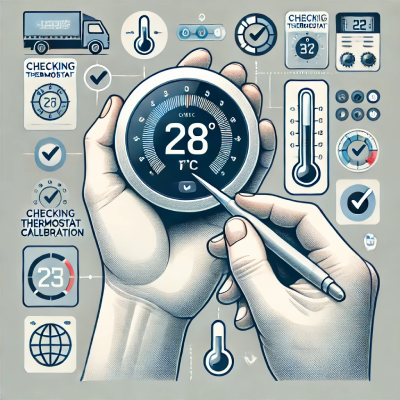
Thermostats are the control centers of your heating and air conditioning system, and their calibration is vital for accurate temperature control and energy efficiency. A thermostat that is out of calibration may result in the system running too often or not often enough, leading to inefficient operation, uncomfortable indoor temperatures, and higher energy bills.
Key steps in checking thermostat calibration:
- Ensuring accurate temperature readings: Over time, thermostats can lose their accuracy, causing them to misread the indoor temperature. This can lead to unnecessary heating or cooling cycles, increasing energy use and driving up utility costs. During routine maintenance, technicians check the calibration to ensure the thermostat is providing accurate temperature readings.
- Adjusting settings for efficiency: Technicians can also help adjust thermostat settings to match your lifestyle. For instance, programmable thermostats can be set to reduce energy use when you’re away from home or sleeping. Smart thermostats can even be programmed to adjust settings automatically based on your habits.
- Battery check or replacement: For battery-powered thermostats, it’s essential to replace the batteries regularly to avoid interruptions in HVAC operation. A dead or weak battery can cause the thermostat to malfunction, leading to system inefficiency or breakdowns.
Ensuring the thermostat is properly calibrated allows your HVAC system to run more efficiently, reduces energy consumption, and keeps your home at a comfortable temperature.
Choosing a Professional HVAC Maintenance Service in Ontario
Hiring a professional heating and air conditioning service in Ontario is crucial for maintaining the efficiency, reliability, and longevity of your HVAC system. A properly maintained HVAC system ensures comfort throughout the year, prevents costly repairs, and maximizes energy efficiency, especially given Ontario’s variable climate. In this section, we’ll explore the importance of hiring certified technicians, what to look for in a maintenance contract, and how often HVAC inspections should be scheduled in Ontario.
Importance of Hiring Certified Technicians
One of the most critical factors when choosing an HVAC maintenance service is ensuring that the technicians are certified. Certified HVAC technicians have undergone extensive training and possess the knowledge and skills to handle the complexities of heating and cooling systems. Working with certified professionals provides several key benefits:
- Expertise and safety: HVAC systems are intricate, combining electrical, mechanical, and refrigerant components. Certified technicians are trained to handle these elements safely and effectively, reducing the risk of mishandling or accidents. They understand how to troubleshoot, repair, and maintain systems in compliance with safety regulations and industry standards.
- Up-to-date knowledge: HVAC technologies are continually evolving, with new systems and energy-efficient solutions regularly entering the market. Certified technicians keep up with these changes through ongoing training and certification renewals, ensuring they are knowledgeable about the latest best practices.
- Warranty protection: Many HVAC manufacturers require that repairs and maintenance be conducted by certified technicians for warranties to remain valid. Hiring an unlicensed technician could void your warranty, leaving you responsible for any future repair costs.
Hiring certified HVAC professionals ensures you receive high-quality, safe service, allowing your system to perform optimally and last longer.
What to Look for in a Maintenance Contract
When choosing an HVAC maintenance service, it’s essential to evaluate the maintenance contract carefully. A good contract outlines the specific services you will receive, the frequency of visits, and the costs associated with the service. Here are key aspects to consider when reviewing a maintenance contract:
- Service coverage: The contract should clearly list the services included in each visit. Common maintenance tasks include filter replacement, duct cleaning, thermostat calibration, refrigerant level checks, and component inspection. Understanding what’s included helps ensure you’re getting comprehensive care for your system.
- Frequency of visits: Maintenance contracts typically offer either annual or semi-annual visits, depending on your system’s needs and usage. In areas like Ontario, where seasonal changes can be extreme, you might prefer bi-annual maintenance—once in the fall before the heating season and once in the spring before the cooling season.
- Additional benefits: Some contracts offer priority service for repairs, discounted rates on parts or labor, and 24/7 emergency support. These perks can provide extra value, especially if your system is older or if you rely on your HVAC system year-round.
- Cost transparency: Ensure the contract specifies all costs upfront, including any potential fees for emergency services, after-hours calls, or parts. A transparent contract will help you avoid unexpected expenses and ensure you know exactly what you’re paying for.
A well-drafted maintenance contract provides peace of mind, knowing that your HVAC system will be cared for regularly and any issues will be addressed before they become serious problems.
Frequency of HVAC Inspections in Ontario
In Ontario, the frequency of HVAC inspections depends on several factors, including the age of your system, the type of system you have, and how often it’s used. However, general guidelines can help you determine how often to schedule maintenance for your heating and air conditioning system:
- Bi-annual inspections for optimal performance: Most HVAC experts recommend scheduling maintenance at least twice a year—once before the heating season (fall) and once before the cooling season (spring). These inspections ensure that your system is ready for the upcoming weather demands and helps prevent unexpected breakdowns during extreme conditions.
- Older systems require more frequent attention: If your HVAC system is more than 10-15 years old, it may need more frequent inspections, as older units are more prone to wear and tear. Regular inspections can help extend the lifespan of older systems by identifying and addressing minor issues before they cause significant damage.
- High-usage systems may need quarterly checkups: Homes or businesses that use their HVAC systems heavily, such as commercial properties or households with large families, may benefit from more frequent maintenance. In these cases, quarterly checkups may be recommended to ensure the system continues to run efficiently.
- Newer systems require less frequent maintenance: If your HVAC system is new, you may only need annual maintenance during the first few years of use. However, following the manufacturer’s maintenance guidelines is essential to keeping the warranty intact.
Maintaining a consistent inspection schedule is vital for keeping your heating and air conditioning system operating efficiently, reducing energy costs, and preventing breakdowns during Ontario’s harsh winters and hot summers.
Conclusion
Regular heating and air conditioning maintenance is essential for Ontario residents to ensure their HVAC systems operate efficiently and reliably throughout the year. Given Ontario’s climate extremes, from harsh winters to hot summers, maintaining your system helps reduce energy costs, prevent costly repairs, and extend the life of your HVAC unit. By investing in regular inspections, proper filter replacement, ductwork cleaning, and thermostat calibration, you can enhance indoor comfort, improve air quality, and avoid unexpected breakdowns.
Choosing a professional HVAC service with certified technicians and a well-structured maintenance plan is crucial for keeping your system in optimal condition. Regular maintenance not only improves energy efficiency but also protects your investment, ensuring your heating and cooling systems serve your home effectively for years to come. Don’t wait for a problem to arise—be proactive in maintaining your HVAC system to avoid discomfort during Ontario’s unpredictable seasons.
Resources
- HVAC.com – Importance of Regular HVAC Maintenance
- Energy Star – Benefits of HVAC Maintenance
- Energy Star – HVAC Maintenance and Tips
- HVAC.com – How Climate Impacts HVAC Systems
- The Spruce – Common HVAC Problems and Solutions
- Energy Star – Benefits of HVAC Maintenance
- HVAC.com – Importance of Regular HVAC Maintenance
- The Spruce – HVAC System Maintenance Tips
- Energy Star – HVAC Maintenance Tips
- HVAC.com – Routine HVAC Maintenance Checklist
- The Spruce – HVAC Duct Cleaning
- Energy Star – HVAC Maintenance Best Practices
- HVAC.com – What to Look for in an HVAC Maintenance Contract
- The Spruce – How Often Should You Service Your HVAC System
- Energy Star – HVAC Maintenance Tips
- HVAC.com – Routine HVAC Maintenance Checklist
- The Spruce – HVAC Duct Cleaning


